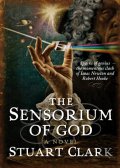 I posted a photo of a rather melancholic sunset on Facebook and Google+ earlier this week and captioned it:  “just photons being scattered by atmospheric water vapour and dust…but still…” I think most viewers did with Trish Parnell suggesting that, ‘The whole is greater than the sum of its parts” and Harvey Leifert describing me as “an incurable romantic” and claiming he “wept while reading about scattered photons”
I posted a photo of a rather melancholic sunset on Facebook and Google+ earlier this week and captioned it:  “just photons being scattered by atmospheric water vapour and dust…but still…” I think most viewers did with Trish Parnell suggesting that, ‘The whole is greater than the sum of its parts” and Harvey Leifert describing me as “an incurable romantic” and claiming he “wept while reading about scattered photons”
On Google+, Joe Repka suggested that “what some people miss is the depth that mystery somehow adds to a phenomenon. Mystery is like a promise for more, a door ajar, a beckoning. Fortunately for our epistemological hunger, any understanding is sure to bring even more questions to entice us with further mystery. How far down does the mystery go? I would guess, ‘Far enough’,” he said.’
 I agree entirely, mystery is an enticement, curiosity, the exploratory instinct, all wonderful. The joy when one recognises an iteration, a small step taken towards a clearer understanding of some phenomenon cannot be beat, viz the “unweaving the rainbow”. The mysteries that process ultimately revealed are myriad from the spectroscopy of matter to the Big Bang theory! We’d know nothing of those vast mysteries without Newton having first “split” light…and the complementary, rival work of Newton and Hooke on gravity and other phenomena so eloquently and dramatically described by Stuart Clark in his latest novel The Sensorium of God, part 2 of the The Sky’s Dark Labyrinth trilogy. Incidentally, the tales of comet discoverer Edmond Halley, architect Christopher Wren, first Astronomer Royal John Flamsteed and others are all woven into the fabric of this pioneering period of scientific discovery and their lives and loves brought to life brilliantly by Clark.
I agree entirely, mystery is an enticement, curiosity, the exploratory instinct, all wonderful. The joy when one recognises an iteration, a small step taken towards a clearer understanding of some phenomenon cannot be beat, viz the “unweaving the rainbow”. The mysteries that process ultimately revealed are myriad from the spectroscopy of matter to the Big Bang theory! We’d know nothing of those vast mysteries without Newton having first “split” light…and the complementary, rival work of Newton and Hooke on gravity and other phenomena so eloquently and dramatically described by Stuart Clark in his latest novel The Sensorium of God, part 2 of the The Sky’s Dark Labyrinth trilogy. Incidentally, the tales of comet discoverer Edmond Halley, architect Christopher Wren, first Astronomer Royal John Flamsteed and others are all woven into the fabric of this pioneering period of scientific discovery and their lives and loves brought to life brilliantly by Clark.
In sharing my sunset photo I could, of course, have mentioned the biochemical wonders of lignin and cellulose in the foreground trees, the osmotic pressure, the transpiration and the photosynthesis all taking place as well as the vernalisation of the narcissi at the foot of the tree…
Jacob Cox described the notion (or the photo) as “Quite beautiful. Scattered photons a very beautiful thing” and Wendy Bailey posited: “Fabulous photons”.
James Brooks commented on G+ that he “will never understand how people can think that understanding a thing takes any of the beauty away from it,” while Erik Swiger emphasised the point saying that, “I think greater understanding brings more appreciation for the beauty of a thing.” Of course, they accused Newton of unweaving the rainbow, but it doesn’t stop the rainbow being as beautiful just because you know understand the optical principles manifest in the colourful arc. On the contrary, it adds an extra dimension to one’s appreciation of reality. It’s a truly Zen notion.